Twelve or 13 months from now, the race for the Republican nomination for president -- and the race for the Democratic nomination, if there is one -- will probably be over.
Prognostications this far ahead of such contests have a sad history. Just ask Rudy Giuliani or Jeb Bush what it felt like when the balloon drop started after their acceptance speeches.
Nevertheless, something can be said about what looks to be a contest between former President Donald Trump and Gov. Ron DeSantis (R-FL). The history of primary contests, since they became the dominant means of choosing presidential nominees in 1972, provides some perspective.
Early on, the Democratic Party often had multicandidate brawls that produced surprise nominees such as George McGovern, Jimmy Carter, Michael Dukakis and Bill Clinton. Meanwhile, the Republican primaries featured one-on-one contests between nationally known contenders -- Gerald Ford versus Ronald Reagan in 1976, George H.W. Bush versus Bob Dole in 1988 and George W. Bush versus John McCain in 2000.
Since 2000, that pattern has usually been reversed. Democrats had one-on-one races in 2008 and 2016 and quickly settled on one among multiple candidates in 2004 and 2020. Republicans, meanwhile, had multicandidate brawls in 2008, 2012 and, with a field too large for a single debate stage, 2016.
This change reflects a change in the parties. In the 1970s, Democrats held majorities in most state legislatures and had many more primary voters and tended to set the rules and schedule. Now, Republicans have more legislatures and about as large and rowdy a primary electorate. Next year, Democrats may renominate their incumbent president, as they did in 1996 and 2012, while Republicans will probably, despite the announced candidacy of former Gov. Nikki Haley (R-SC), be headed to a two-candidate race.
Recommended
Past contests suggest what this will look like. Republicans' multicandidate races in 2008 and 2012 quickly boiled down to two-candidate runoff jousts. These pitted candidates (McCain, Mitt Romney) who carried counties in major metropolitan areas, where Republican primary voters tend to be college graduates, against candidates (Mike Huckabee, Rick Santorum) who carried counties outside major metro areas, where most Republican primary voters are not college graduates.
This was a forecast that few analysts (including me) recognized, of the split between white college graduates and nongraduates, who voted similarly in general elections up through 2012 but have responded sharply differently to Trump in 2016 and every election since.
But the dominance of noncollege white people in Republican primaries can be overstated. If McCain and Romney prevailed by only narrow margins over Huckabee and Santorum in primaries in Michigan and Ohio, Trump won the nomination in 2016 with only a 44% plurality of votes in a 16-candidate field.
In the 31 states that voted up through April 5 that year, Trump had significant leads of 4 points or more over the combined totals of Sens. Ted Cruz (R-TX) and Marco Rubio (R-FL) in only five states (New Hampshire, Massachusetts, Mississippi, Ohio and Arizona). If you add in the votes for John Kasich, whose John Weaver-managed campaign pitched its appeal to the kind of Republican voters who dislike Republican voters, the list narrows down to just Massachusetts and Mississippi.
All of which suggests that DeSantis could compete successfully with Trump in the bulk of primaries and amass delegate totals to withstand Trump's strength in states such as New York and West Virginia, whose primaries come later -- much as the delegate strength Barack Obama built up in February 2008 enabled him to withstand the grueling four-month marathon with Hillary Clinton that followed.
This is in line with such multicandidate polling as has been conducted. After the November midterm elections showed backlash against Trump-supported candidates, Trump's lead over DeSantis dropped to 47% to 29% and is currently 44% to 29%. That number is almost identical to the 45% of votes he received in all 2016 primaries and caucuses.
Interestingly, polls by the Republican firm Public Opinion Strategies taken last week show DeSantis leading Trump in Iowa and even with him in New Hampshire, with Trump approximating his 2016 showings in those states. Good DeSantis showings there might winnow the field right away or after Haley's South Carolina soon after.
Political analysts alert to any turn in opinion have noted that DeSantis' numbers have sagged a bit in recent weeks. It may be more significant that the universally known Trump fails to win the support of 56% of his party's voters. And that in head-to-head polls, Trump has usually trailed DeSantis.
Of course, nothing is for sure yet. DeSantis hasn't even announced he's running, the primary and caucus schedule is not set, and there's no guarantee that the 76-year-old Trump or the 80-year-old Biden will be in good health next year. But history and current polling suggest the majority of voters who don't want to elect either of these two almost-always-negatively-rated presidents may find a way to get their way.
Michael Barone is a senior political analyst for the Washington Examiner, resident fellow at the American Enterprise Institute and longtime co-author of The Almanac of American Politics.

























Join the conversation as a VIP Member